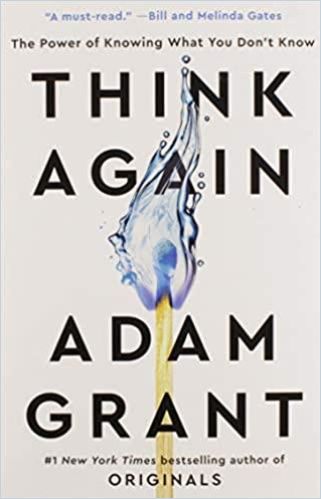With Think Again, Adam Grant has produced his best work yet. In a polarized world where stubborn factions seem to form around every issue, Grant offers a simple antidote: 1. Keep an open mind. 2. Think and act like a scientist. 3. Revise your opinions when the evidence demands it.

Unlearn, Relearn
Wharton organizational psychology professor Adam Grant has earned wide renown and respect as one of this era’s most brilliant lecturers, researchers and writers. Unsurprisingly, his book shot up on bestseller lists even before its release.
Grant sometimes faces criticism for taking other scholar’s ideas and turning them into popular books and articles. In fact, this is his strength. He explains human psychology in layman’s terms and does so through engaging stories meant to make the reader feel smart, not the writer. If you incorporate Grant’s advice into your behavior, you will improve your life and lives of those around you.
Question What You Know
Grant opens with the tragic tale of 16 firefighters who found themselves in the path of a fast-advancing wildfire. The three in the lead managed to outrun the flames. As the fire caught up with the rest, one stopped. He set fire to the brush around him and implored the others to do the same. He lay down safe in the area he had cleared, but the other 12 were consumed. They simply couldn’t act against their training, experience and instincts.
Throughout, Grant refers to studies and relates anecdotes that show the wisdom of rethinking your beliefs, questioning your convictions and maintaining an open mind. He encourages you to discover the joy of being wrong.
Ironically, says Grant, a high IQ often comes with confidence (even arrogance) that makes changing your mind harder. Grant makes an example of Mike Lazaridis, who in the 1990s conceived of the Blackberry, then the world’s most advanced and popular cell phone. Yet when Apple prototyped its iPhone, Lazaridis refused to believe that people wanted touchscreens, apps and browsers on their phones. He clung to his convictions, even after consumers began buying iPhones in droves. Blackberry’s share of the market dropped from 50% in 2009 to less than 1% in 2014.
Stay Curious and Test Your Assumptions
Importantly, Grant warns against marrying your beliefs and ideas to your identity. When you do, ego and emotion will blind you, closing your mind to new evidence. You preach your point of view like an evangelist and attack other positions like a prosecutor. Unsurprisingly, these approaches rarely change people’s minds.
Grant repeats his most critical advice throughout the book. He recommends, for example, thinking like a scientist: Scientists revel in the discovery of new evidence because it improves their models and assumptions. They know they’ve learned something even if they disproved their own hypotheses. They seek the truth, forming no sentimental or prideful attachments to their ideas. Grant’s promise makes sense: You will learn more, make better choices and build more productive relationships if you take a scientific, detached approach to truth-seeking.
Grant attacks the myth of strong leaders or entrepreneurs who never waver from their crystal clear visions. In reality, he says, wise leaders remain open to evidence, making decisions for their firms as the circumstances and evidence warrant.
Stay Humble
Often, the less knowledge people have, the more certain they feel about their opinion. Grant illustrates this phenomenon – the Dunning-Kruger effect – using examples from a variety of fields. He shows that humility overcomes arrogance. He describes research that shows that subjects who simply read about admitting a knowledge gap become significantly more likely to ask for help afterward. Grant urges you to use self-doubt to fight complacency and overconfidence. Let it make you work harder and keep you in a learning mind-set.
The purpose of learning isn’t to affirm our beliefs; it’s to evolve our beliefs.
Adam Grant
Grant narrates situations where he failed to rethink his decisions or clung to his beliefs. His self-deprecating humor is humble and disarming, and helps readers relate. Once, he recalls, a student came to him for advice on which school to attend for an MBA. Citing research, Grant instead tried to talk her out of doing an MBA altogether. In the end, he had to admit that he hadn’t been helpful. Express your own opinions and critiques with sincerity, but also uncertainty and humility. To debate rather than argue, ask questions and seek others’ perspectives. Develop the discipline of letting others speak. Listen to them carefully. Grant does believe in facts – but recognizes that you won’t win people over by assaulting them with data.
He uses the charged issue of vaccinations to make a strong point. Doctors may know the facts and the science cold, but they can’t convince parents to vaccinate their children if they insinuate they are bad caregivers for refusing to do so. Grant recommends asking questions that provoke reflection. He says that often gets others to talk about the pros of your argument. Listening intently, mirroring and reflecting relaxes people, and makes them less defensive and nervous and more open to alternative views. As Grant points out, intensive listening is so rare that it often eases people into delivering their most thoughtful and honest answers.
Grant suggests that you point out weaknesses in your own arguments and acknowledge what you don’t know. Doing so demonstrates integrity and curiosity. Some readers may question whether all of Grant’s insights apply equally across the board. If it’s true that admitting fallibility and knowledge gaps makes a male, white expert seem more credible, is the evidence conclusive for female, nonwhite career beginners? Grant doesn’t specify – and you shouldn’t consider any evidence to be conclusive anyway.
Embrace Complexities and Nuances
Grant tells an extraordinary story about decades of research in which strong pro-life and pro-choice individuals come together to debate abortion. Beforehand, some read articles about other controversial issues – like gun control – that offer a balanced analysis rather than a one-sided argument. Here, subjects came to agreement on abortion an impressive 46% of the time. However, when subjects read an article that describes the topic with complexity – acknowledging the many nuances surrounding the debate – they found common ground every single time! Grant argues that while people may crave simplicity, complexity and confusion can prompt humility, open-mindedness, and curiosity. This insight alone perhaps could change the world if more people applied it in their work and private lives.
Everyone should live by Grant’s bottom-line and timely advice: Stay humble. Redefine yourself as a curious person dedicated to seeking the facts, even when they prove you wrong. You may have heard these fundamentals before, but no one has put them together more concisely or as persuasively as Adam Grant in Think Again.













